DOG OF A MUSICAL
The musical theatre canon is filled with bad ideas that made very good musicals. Stories of vengeful barbers, decadence in Nazi Germany, and even wife beaters have all gone on to become gold standards. Unlike Sweeney Todd, Cabaret, and Carousel, Dogfight, which is currently on the boards at the Second Stage, would not have seemed like such a bad idea had it been able to overcome the challenges to become a good musical.
Dogfight the musical is based on the 1991 Warner Brothers film written by Bob Comfort. The premise of Dogfight is charmless and somewhat offensive: a group of marines in 1963 compete to see who can bring the ugliest girl to a party, and the ugliest one wins. Romance slowly follows between Marine Private First Class Eddie Birdlace (Derek Klena) and Rose Fenny (Lindsay Mendez), the folk music-loving waitress that he degraded during the party, a tradition known as a “dogfight.” Not exactly a natural fit for the musical form unless the despicable leading character makes a HUGE character reversal, which of course, he does — but not until the audience has to sit through an hour observing his unkindness. Imagine a Neil LaBute play set to music and you get the idea.
The biggest challenge with the story lies in the actor playing Eddie Birdlace, who must construct a character full of intricacies and contradictions. Derek Klena is not quite up to the task. In the film, River Phoenix had a natural vulnerability that leavened the early cruelty of his character. Klena’s Eddie leads with anger and punches with arrogance, so that when a more compassionate human behavior emerges, it feels more like a plot device than a natural character arc. Book writer Peter Duchan should take some of the blame here; he doesn’t let the audience into Eddie’s more sympathetic characteristics until it’s far too late for a solid, well-earned audience perception shift.
The stronger and more sympathetic of the two leads, Rose, is played sweetly by Lindsay Mendez. Although she is naturally too pretty for the role, she sings her ballads beautifully: the Act One solo “Pretty Funny” is both hers and songwriters Benj Pasek and Justin Paul’s best moment. But with so many pop ballads, by the time Rose sings “Before It’s Over,” it’s a classic case of diminishing returns.
The rest of the ensemble is competent, playing multiple roles. They always sing well and make their way through the predictable loss of virginity and tattoo subplots, but there are no standouts in the cast.
Pasek & Paul are definitely a song-writing team to watch; their songs have excitement and confidence — even if they don’t always work dramatically — and the melodies are always tuneful, if a bit generic. The result is closer to Glory Days than Spring Awakening. Pasek’s lyrics pop and charm with appropriate references of the time (Dinah Shore, Perry Mason, etc.); considering Pasek and Paul were not alive in ’63, to their credit, the time references never feel too distant. Still, I would have preferred a score with a few more 1963 pastiches to ground the story with a sound that resides more within its timeframe (musical director Bryan Perri and orchestrator Michael Starobin deliver a solid sound with very little extra). Peter Duchan’s dialogue entertains from moment to moment, but the overall story is still so attached to its cinematic origins that it never completely justifies its existence on a theater stage.
Joe Mantello is usually a better director. In Dogfight, his production seems adrift, unable to land on one style. He often reaches for cheap, easy laughs, the kind that play well in a big Broadway house. But Off-Broadway, where the expectations are more down to earth, the choice feels out of place. Dogfight is often a serious, depressing piece, but Mantello’s choice of sporadic broad comic strokes undermines the authenticity of the journey. We are left feeling pandered to instead of entertained. Mantello’s best directorial moment comes when the story moves from San Francisco to South East Asia, a transition done with effective silence. If Mantello had trusted the simplicity of stagecraft instead of being so eager to please, he might have had a more successful production. The choreography of Christopher Gattelli (Tony-winner for Newsies) is unobtrusive as he works well on a small stage with a cast of non-dancers.
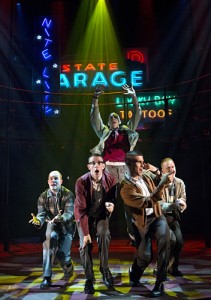 David Zinn’s set and costumes are utilitarian and full of surprises. A reflective back panel suggests a world of memory without beating you over the head with the fact that the musical is structured like a memory play. One of the highlights of the show is when the set gracefully transforms itself into a moving sidewalk for the leads to take a romantic walk. The technical aspects never swallow the evening, but allow the piece an organic sense of intimacy.
David Zinn’s set and costumes are utilitarian and full of surprises. A reflective back panel suggests a world of memory without beating you over the head with the fact that the musical is structured like a memory play. One of the highlights of the show is when the set gracefully transforms itself into a moving sidewalk for the leads to take a romantic walk. The technical aspects never swallow the evening, but allow the piece an organic sense of intimacy.
Source material matters. Dogfight only connects with its audience in the few intimate moments it teases us into thinking it might actually become a romantic comedy, the very genre the source material is rebelling against. What we’re left with is an unsatisfying theatrical event similar in nature to the main character — ashamed of who he is, with every choice accompanied by the whiff of apology. This dog, unfortunately, lost the fight before it began.
photos by Joan Marcus
Dogfight
Second Stage Theatre
ends on August 19, 2012
for tickets, visit Second Stage
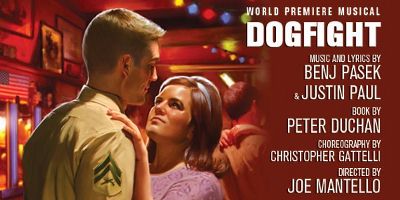
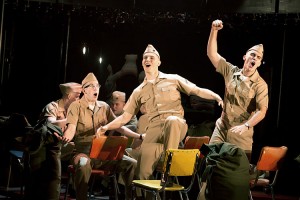
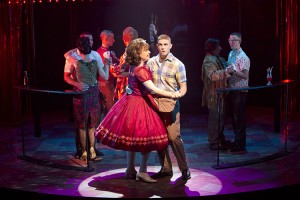
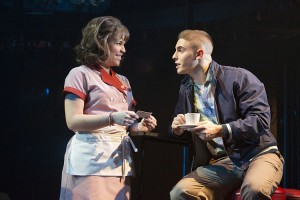
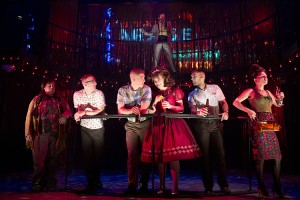
{ 1 comment… read it below or add one }
I disagree with this review in general. In particular I would like to ask the writer which audience members he interviewed to learn that the musical had not connected with them. Certainly the audience I saw the show felt connected, and I talked to them at intermission and afterwards.
Critics often make these kinds of presumptive statements with no actual basis for judging. Speak for yourself only, if you please.